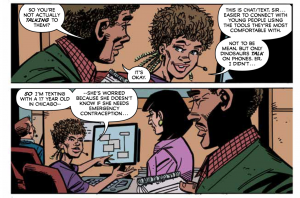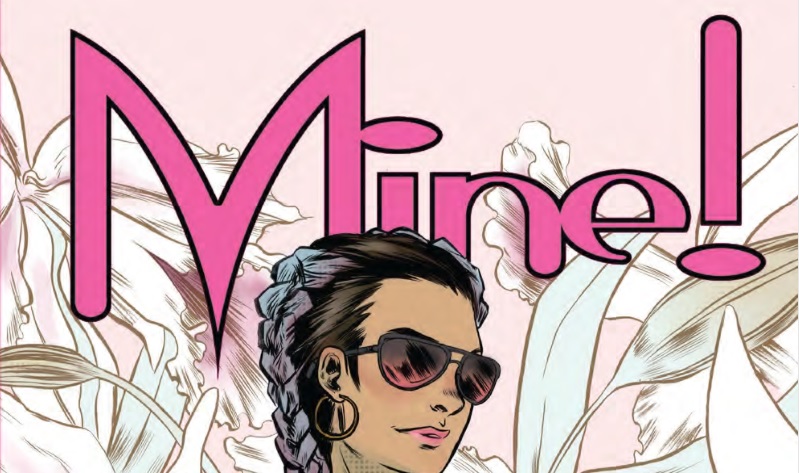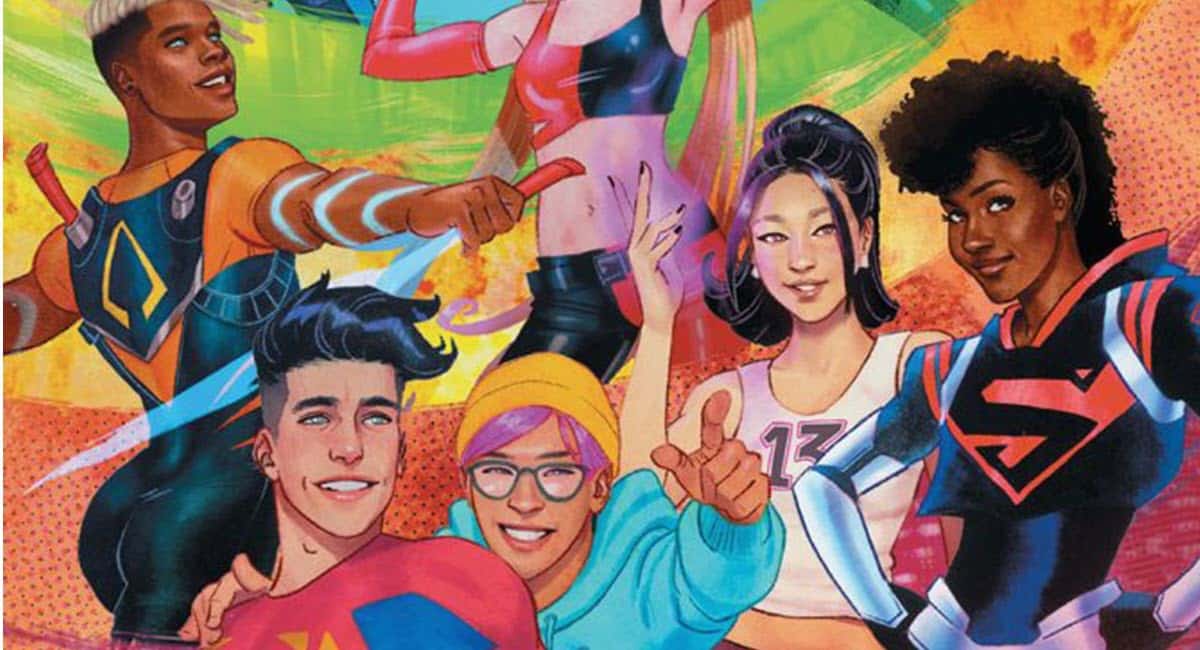In August 2017, ComicMix launched their Kickstarter for Mine!, a comics collection benefitting health services organization Planned Parenthood. Mine! features contributions from Eisner-Award winners and nominees to independent creators and up-and-coming artists, aimed at celebrating freedom and choice, and to help dispel myths and misconceptions about sex, gender, and reproductive health. Fortunately, the Kickstarter was a success, raising nearly $60,000 for the collection’s production. All proceeds generated by the book will go towards Planned Parenthood, which is ever at risk of being blocked from receiving federal Medicaid funding by President Trump’s administration. Such a development would be particularly concerning as Planned Parenthood provides health care, medical screenings, education, and resources for reproductive and sexual wellness to people from all walks of life.
On Monday, my colleague Nicholas Eskey interviewed Justin Hall on his contribution to the Mine! anthology. You can read his excellent interview here. For this installment of THE BEAT’s interviews with the creatives behind the comic, I had the good fortune to chat with Paul Levitz, who, besides being an industry leader and legend, is also one of the finest historians and theorists on the comics medium. (He was also one of my professors during my time at Columbia.) Along with co-writer Joe Statton, Paul contributed a moving story about the overlooked work Planned Parenthood does with its online chat and text services.
AJ FROST: Hi Paul! So nice having the chance to chat with you. Let’s start off with the basics: How did you get involved with the Mine! project? How did you get in touch with the fine folks at ComicMix?

PAUL LEVITZ: The guys shot me an email. I was vaguely aware of [the project] from a conversation with Glenn Hauman—I think at a signing I was doing when I saw him—and he talking about trying to get it organized. I offered to be helpful in any way that I could, in terms of contributing or in terms of helping them connect with Planned Parenthood. And then once they got it up and running, I think Joe Corallo may have been the one who reached out and say, “Hey, why don’t you reach out and do something together? You guys are buddies.” I said sure, and Joe was happy to.
FROST: The story you wrote about Planned Parenthood’s texting program is really powerful. What influenced the story that you ultimately wrote for this comic?
LEVITZ: I admit my prejudices on the subject. The project was important to me because Planned Parenthood does a lot of important work. Not only because of the cultural climate we’re in and the challenges they face, but also because my daughter’s an executive there and the story that I wrote is set in the world that she’s responsible for.

FROST: So, it was important for you to tell this story because of how important this component of Planned Parenthood and because most people might not be aware of it?
LEVITZ: You know the stereotype—political bullshit aside—the variety of contacts that Planned Parenthood has with people is fairly wide. And if you’ve been a client of theirs, you know it. I’ve heard many people I know express personal appreciation. But there are lots of things they do that are largely invisible. The chat text system that they use… I forget the exact number but it touches something like 180,000 people. That’s a lot of people who are concerned, searching for information, and searching for reassurance. Most of us are not conscious of that because we’re not in that situation to be reaching for it. Most of us have a family doctor or are not at a stage of life when we have confusion about these issues or concerns about these issues. But there’s a lot of particularly young people who are searching for help and searching for answers. And I thought it would be good to remind people or make people aware of the sheer weight of that.
FROST: Do you think that the current political climate means that the types of storytelling that are featured in Mine!—as well the Love Is Love comic, the Puerto Rico Strong anthology comic, or even the material that François Mouly and Nadja Spiegelman published for the two volumes of Resist!—is going to be more prevalent in the marketplace? Or, are we just in this new era of politically relevant storytelling anyway, and comics are just one of the best mediums to get all these different kinds of stories out there under one banner?
LEVITZ: Well, comics have a good history of political activity and being a voice for it. Certainly, an awful lot of what went on in the undergrounds in the 60s. There was just an exhibit in the Rare Book Library at Columbia University of the 1960s, and there were a ton of things that were done in cartoon form, evoking the protests against the Vietnam War. I think the benefit books themselves specifically carry a nice emotional weight.
And you know, people respond to them emotionally. I’ve signed more copies of benefit books I’ve worked on than most things that I’ve written; Heroes Against Hunger from the 1980s, for example. I think people like them both because they’re anthologies, so there’s kind of a scavenger hunt element to chasing down all the signatures. But also because they feel good about having participated. Like, “Hey I did a little something and a little portion of the dollar I spent today is gonna do some good.”
FROST: I really felt that there is just such a nice diverse collection of material within this book, where it’s not just talking about a particular point of view. It’s simply a nice almanac of all these different perspectives and these diverse voices. In your view, how important is it that these types of comics actually collect different viewpoints and disseminate them in a relevant way?
LEVITZ: It’s better storytelling if you’ve got different aspects of the story from different creative people. The joy of an anthology well done is that you get different styles; you get different emotional tenors; different goals that the different creators have. And that can be lovely in books this size.
FROST: Going back to what you said about your daughter being an executive of Planned Parenthood, what has she been experiencing in recent years that, maybe indirectly, influenced how you wrote your piece for this book?
LEVITZ: I don’t wanna speak for her experience. I think what influenced me was seeing her dedication to the program that she’s helped build and seeing the importance it was having in people’s lives.
FROST: Ultimately, what do you hope to achieve with what you’ve written for this book, and for the Mine! collection as a whole? Do you think that it can be used as a resource for people to learn about all these different aspects of Planned Parenthood that they might not have known about before?
LEVITZ: I think with any of these benefit books, you hope that it raises the consciousness on the issue that you’re talking about. And you hope that it raises a few bucks for a good cause. It’s not gonna be life-changing money for Planned Parenthood, but every dollar counts in the process; it goes to help people. And consciousness can be anything from the 15 minutes or half-hour somebody spends reading this book one day, and says, “Oh yeah, I didn’t realize they helped people in that situation,” to in some cases, getting people to volunteer or become more politically active in a specific cause. If you reach a large number of people, odds are you’ll get some of both of those things happening, as well as people who just read it and say, “Oh well that was a nice comic book! What’s the next thing I’m gonna read?” That’s okay, too.
FROST: Okay, last question and this may sound silly but: Why is Planned Parenthood important? Why do this at all?
LEVITZ: A massive percentage of the healthcare given to women in this country is given through the Planned Parenthood system. Women’s basic health needs are not provided for in many parts of the country. Health costs are a significant burden on families, and Planned Parenthood’s health centers touch people’s lives. If that’s a chat center simply saying, “Oh yeah, that symptom does sound like you should go see a doctor or you should go to a health center, and here’s the address of a place you can go” or, “No that doesn’t sound like a problem. You’re probably okay, why don’t you do x and y,” those are meaningful effects on people’s lives. And when you’ve lived a life of privilege, had a family doctor over the years, had healthcare resources available because of insurance, family wealth, or just where you were brought up, you can easily underestimate the importance that these resources have in places where those things aren’t true.
Mine! is now available for preorder: http://bit.ly/2gzl2bb








Incidentally, the exhibition on The Global 1968 at Columbia’s Rare Book & Manuscript Library is up through May. It’s open to the public, Monday 9am-7:45pm; Tuesday through Friday 9am-4:45pm.
Karen!! So lovely seeing you here in the comments of the Beat! Oh… If only I could make it back to the ol’ Alma Mater to check out this exhibition!
Comments are closed.